Electron Configuration Of Ag 1
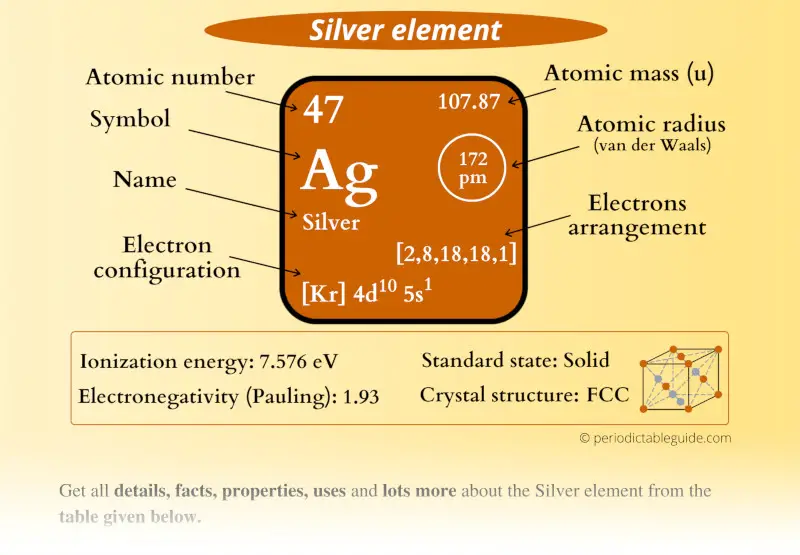
This is a SUPER easy guide on Silver element.
In fact, the table mentioned below is the perfect information box (Which gives you every single detail about the Argent chemical element in Periodic table.)
And so if you want to know anything about Silver element, then this guide is for you.
Let's terminate this very quickly.
Silverish Element (Ag) Data
| Appearance of Silver | 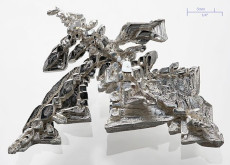 White metallic luster |
| Country of Silver at STP | Solid |
| Position of Silver in Periodic table | 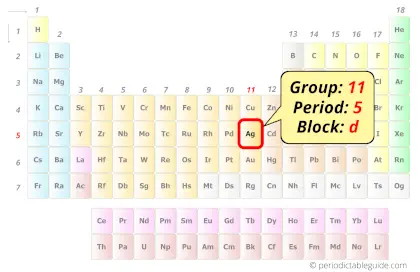 Group: 11, Period: five, Block:d |
| Category of Silver element | 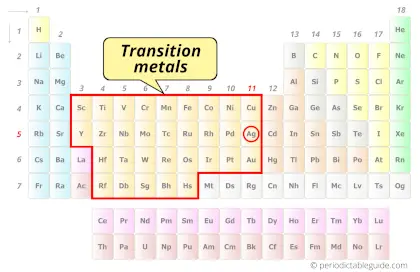 Transition metals |
| Atomic number of Silver, or Protons in Silverish | 47 |
| Neutrons in Silver | 61 |
| Electrons in Silver | 47 |
| Symbol of Silver | Ag |
| Atomic mass of Silver | 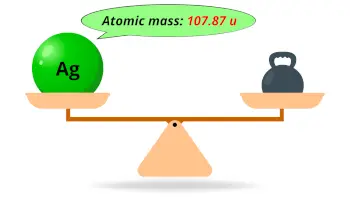 107.87 u |
| Electrons system in Silverish or Bohr model of Silver | 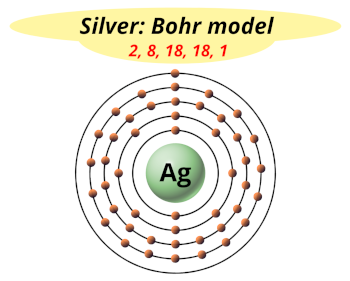 2, eight, 18, eighteen, 1 |
| Electronic configuration of Argent | [Kr] 4d10 5s1 |
| Atomic radius of Silvery | 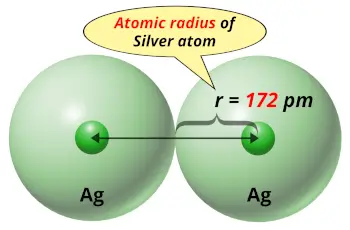 172 picometers (van der Waals radius) |
| 1st Ionization energy of Silvery | 7.576 eV |
| Electronegativity of Silvery | 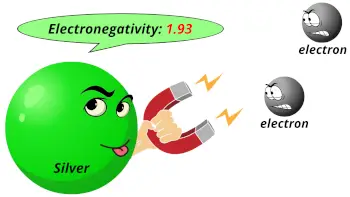 one.93 (Pauling scale) |
| Crystal structure of Silverish | 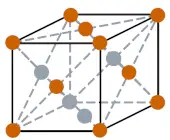 FCC (Face centered cubic) |
| Melting indicate of Silvery | 1234.9 K or 961.seven °C or 1763.2 °F |
| Boiling point of Silver | 2435 K or 2162 °C or 3924 °F |
| Density of Silvery | 10.5 g/cm3 |
| Master isotope of Silver | 107Ag (51.8%) and 109Ag (48.1%) |
| CAS number | 7440-22-four |
Silverish in Periodic tabular array
Silver element is in grouping eleven and period 5 of the Periodic table. Silver is the d-block element and it belongs to transition metals group.
←Motion to: Palladium (Pd) element – Periodic Table
→Move to: Cadmium (Cd) element – Periodic Table
Why is Silver in Period v?
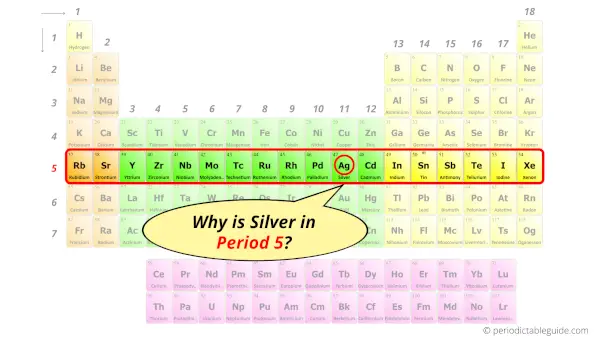
Let me ask you a question.
How many shells does silverish have?
It's v. Right?
You have already seen the bohr model of silver atom in the to a higher place tabular array.
From the Bohr model, information technology can be found that the number of orbits or shells in silvery is 5. Hence, every bit silver has five orbits, it lies in period five of the Periodic table.
Why is Argent in d-block?
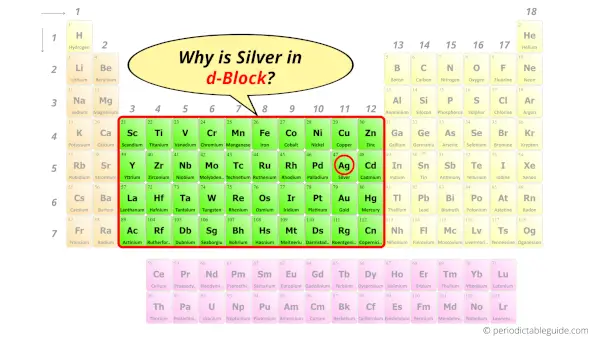
Earlier knowing this reason, first of all I want to enquire you lot a simple question.
How can you determine the blocks-wise position of elements?
The unproblematic answer: The elements will lie in the s, p, d or f block volition completely depend upon the subshell in which the concluding electron will enter.
For example; the electron configuration of silverish is [Kr] 5s1 4d10.
So the last electron of silverish enters the d-subshell or d-orbital.
Hence, silver is the d-cake element.
Is Silver a Transition Metal? Why?
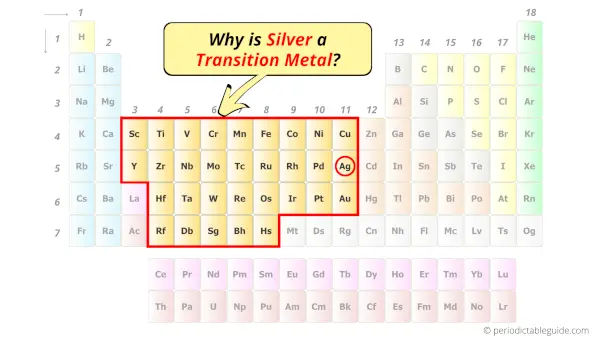
Yes , Silverish is a transition metal considering it has incompletely filled d-orbital in its common oxidation country (Ag two+ ).
Let me explicate the exact meaning of this.
According to the definition of transition metals;
The element should compulsorily take incomplete d-orbitals, either in their ground country (M) or well-nigh common oxidation states (M1+, Mii+, etc) then but they are called transition metals.
Now, the ground land of silverish ways its normal state in which it has neither gained nor lost any electron/s (i.e Ag).
And the common oxidation states of silver are Ag+, Ag2+, also as Ag3+.
Now, let'due south meet the example of silver with oxidation land +two. And then,
The electron configuration of Ag is: [Kr] 4d 10 5s 1 and
The electron configuration of Ag 2+ is: [Kr] 4d nine
Then, in this +2 oxidation land of silver (Ag2+), if we see the electron configuration, then it possesses incomplete d-orbitals.
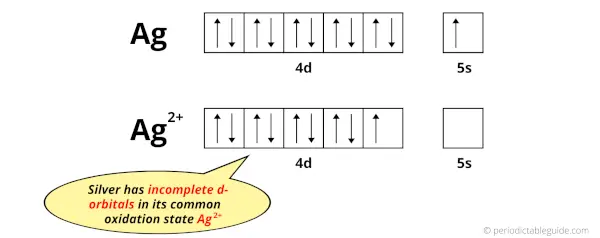
You can see that all the d-orbitals are completely filled (all the 10 electrons are nowadays) in the elemental land (Ag) but they are incomplete (only 9 electrons are present) in its oxidation state (Agtwo+).
In short, silver element accept incomplete d-orbitals in its oxidation state (Ag2+).
Hence, according to the definition mentioned to a higher place, silvery is a transition metal.
7 Interesting facts about Silver
Interesting facts about argent element are mentioned below.
- The name silver was derived from the Anglo-Saxon word "seolfor".
- United mexican states is the leading producer of silver in the world.
- In aboriginal times, the silver metallic was used as a currency. And in ancient Arab republic of egypt, one time it was valued more than gold.
- Silver is so ductile metal that one ounce of argent can be fatigued into effectually 8000 feet long wire. [1]
- Silver is generally obtained as a byproduct during the mining of copper, zinc and lead.
- For a long time, silver has been known every bit "poor human'south gold".
- The official currency of Uk (i.east Pound Sterling) was initially equal in value to i pound of silver.
Properties of Silver
The concrete and chemical properties of silverish element are mentioned below.
Physical properties of Silver
Physical backdrop of silver are mentioned below.
- Silver is a solid metal having a lustrous white surface.
- Out of all the metals on the periodic table, pure silver is the best conductor of heat and electricity.
- Silvery is a ductile also as malleable metal.
- The atomic mass of silver is 107.87 u and its density is 10.5 g/cmiii.
- The melting point of argent is 961.7 °C and its boiling point is 2162 °C.
- Silver has a FCC (Face centered cubic) crystal structure.
- Silverish has natural isotopes too as artificial isotopes. Out of them, the stable isotopes are 107Ag and 109Ag having an abundance of 51.8% and 48.1% respectively.
Chemical backdrop of Silvery
Chemical properties of argent are mentioned beneath.
- Silver is a transition element having incomplete d-orbitals.
- When silvery is kept open in the air for a longer time, information technology tarnishes and turns night grey in color. Hence information technology requires polishing.
- When silver is exposed to hydrogen sulfide it reacts with sulfur and forms a black sulfide layer on it.
- Argent does not evidence any chemical reaction with water, acids, as well as other compounds.
Uses of Silver
Uses of silver are mentioned below.
- Silverish is a precious and nonreactive metal and hence it is used in making jewelry.
- Silver has an ability to reflect the visible light, and hence it is used in manufacturing mirrors.
- As silver is a skillful usher of electricity, it is used in manufacturing battery components as well every bit other electronic devices.
- In ancient times, silver bottles were used to store water, wine, vinegar etc to protect them from bacteria contagion.
- In India, sweets are decorated with a very thin layer of silvery (which nosotros can eat).
- Silver was besides used by dentists as a fabric for filling cavities.
Gratuitous Gift for you: Interactive Periodic Tabular array
Permit me tell y'all how this Interactive Periodic Table will help you lot in your studies.
1). Y'all can effortlessly find every single detail about the elements from this single Interactive Periodic table.
2). You lot volition become the detailed information most the periodic table which volition catechumen a newbie into pro.
3). You lot will also become the Hard disk drive images of the Periodic table (for FREE).
Checkout Interactive Periodic table and download it's loftier resolution image now (It's Complimentary)
References:
Chemic information: Wikipedia, Chemspider
Silver element: Image credits- wikimedia commons
Electron Configuration Of Ag 1,
Source: https://periodictableguide.com/silver-ag-element-periodic-table/
Posted by: harisowayll.blogspot.com

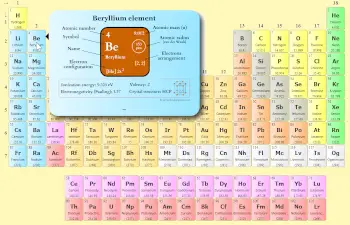

0 Response to "Electron Configuration Of Ag 1"
Post a Comment